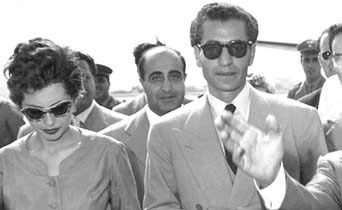Elizabeth Sullivan
It was probably pure coincidence that the bloodiest day in U.N. history, the day a massive truck bomb killed the world body’s chief Iraq envoy and 19 others, came on the 50th anniversary of the CIA-plotted coup in Iran that seeded today’s Islamic terrorism.

Or, maybe not. New York Times reporter Stephen Kinzer calls the Aug. 19, 1953, coup the first time the U.S. government overthrew another. The Iraq war merely was the most recent. But the eerie parallels don’t stop there. Not only was the 1953 overthrow of Mohammad Mossadeq, Iran’s elected prime minister, driven by the same ideological blinders and greed for oil that stoked our current blunder in Iraq. It also inspired a worldwide militant Islamic movement that burped up today’s al-Qaeda.
Otherwise brilliant politicians and military and intelligence operatives who plotted the overthrow failed to anticipate any of the negative long-term consequences. When irate Iranians finally threw off the U.S.- and British-installed shah and embraced radical Islam in a 1979 revolt, Washington looked for allies close by. The result was the brief U.S. embrace of Saddam Hussein in Iraq, just when he needed Western help in his drive for chemical, biological and nuclear weapons.

Other ugly consequences mirror those that soon could face us in Iraq. A people who once admired Americans learned to hate us, then rushed the other way politically, to embrace radical Islam over Western-style democracy. The nation whose influence we most dreaded - Russia - became Iran’s major nuclear supplier and a chief bidder for its oil. It’s as if we can never learn the lessons of history.
In “All the Shah’s Men,” his new book about the 1953 coup and its consequences, reporter Kinzer quotes Harry Truman saying, “There is nothing new in the world except the history you do not know.” Truman is the wise man in Kinzer’s tale, the one who chose “containment” over violent overthrow. His successor in the presidency, Dwight D. Eisenhower, was not so wise. He preferred action and a roll of the dice in Iran. Why? To counter what the die-hard Cold Warriors on his staff took to be Truman’s wimpiness in the face of the Soviet threat.
Substitute “al-Qaeda” and “WMD” for “Reds” and “commies” and it all begins to have a very familiar ring. Why do they hate us? The question so often posed after Sept. 11 has its partial answer in this disgraceful act of 50 years ago, which demonstrates how political buffle-headedness can so abuse operational bravery and smarts. A secret CIA after-action report on the coup obtained several years ago by James Risen of the New York Times reveals how U.S. spies and military intelligence agents brilliantly manipulated a divided Iranian army, shoving out the Mossadeq government in an almost bloodless one-day coup. The Middle East changed forever on Aug. 19, 1953, as it did again in March 2003.
Yet in choosing a seemingly weak, waffling royal to carry the West’s banner in Iran and help them shield their flouting of law and their real aim of grabbing the oil and denying Moscow a strategic prize, the U.S. and British governments miscalculated badly. Once back in power, Shah Mohammad Reza Pahlavi ruled by brute force until the 1979 Islamic revolution that ousted him and America from the scene.

The Pentagon desk types still touting the sleek, well-shod Ahmad Chalabi in Iraq should pay heed. Someone who has spent most of his exile in posh digs in London, who has no discernible power base in Iraq beyond some hangers-on, relatives and shady associates, is not to be trusted. Just yesterday, Chalabi popped up in Baghdad, saying he’d known all along that a terrorist act was brewing, just couldn’t get anyone to listen. Hmmm.
At some point proximate to the overthrow of one man comes the rise of someone potentially worse. The ayatollahs in Iran inspired radical Islamic movements around the world and continue to pour money into terrorist endeavours. Saddam himself was strengthened at home and helped in his quest for weapons of mass destruction by Western governments spooked by Iran’s 1979 revolution.
It is not too late to avoid some of the most disastrous consequences of our latest blunder. But that will require avoiding the wilful ideological blindness that drew us into a war over a nonexistent threat, thereby bringing that threat into being.
Sullivan is foreign-affairs columnist and an associate editor of the Cleveland Plain Dealer.